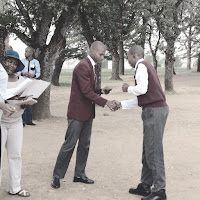 |
| The Camp BRO bros |
“I want to start a hospital that has a neurosurgeon,” a
young man says in response to fellow PCV
Danielle’s question asking for the
fifty boys what their goals are.
It is Saturday morning and I am exhausted after staying up
the night before doing evening activities with the same boys. I am exhausted
but profoundly happy.
Camp BRO [Boys Respecting Others] is the male equivalent to
the
Camp GLOW I co-directed in September.
Unlike in September, however, I am not in charge this time. This means that I
have the energy and enthusiasm to lead energizers and activities and to joke
around with the guys.
 |
Nt Lebohang from the Business
Economic Development Corporation
leads a session on business. |
Yolanda, an amazing woman that lived in my training village
back in Pre-Service Training, has done an astounding job planning the camp.
Nearly all the sessions-covering topics including goal setting, leadership,
business skills, career development, gender, and sexual reproductive
health-have at least one host country speaker or organization leading the
session. This helps the participants to connect with a number of professionals
in their community but also dramatically increases the amount of effort Yolanda
has had to invest in communicating and planning.
 |
| Danielle smiling during her HIV test. |
Not long after Danielle and Adrian's session on goal
setting, a woman from the local clinic arrives to offer HIV testing throughout
the day. Since the boys are in a session on business development, Danielle and
I jump on the opportunity to take HIV tests. After the session concludes, we
skip into the hall and share the testing opportunity by showing them our
testing strips. Abuti Khotso, a sassy and fun young man, challenges me, “Would
you show us if you were HIV positive?” I surprise him by letting him know
that yes, I would in fact show them my results even if I had HIV. He notes that
HIV is a death sentence, which opens the door for Danielle and me to share that
if an HIV positive person takes anti-retrovirals correctly, HIV is now less
dangerous than other common conditions in Lesotho like high blood pressure or
diabetes.
Later in the day, I am co-facilitating the session on Sexual
Reproductive Health with some volunteers from the Lesotho Red Cross. As I
discuss the female reproductive system, I am again surprised as most of the
many questions I am asked are about the biology and genetics of reproduction,
not sex.
That night we have a bonfire with s’mores. Jamilla, another
PCV, starts doing some call and response camp songs. When Boom Chicka Boom
begins, I jump up with enthusiasm. I have not sung my favorite verses of this
camp classic in years and I am absurdly excited.
 |
The new BRO Club president hands
out certificates to his Bros. |
Living in my community in rural Botha Bothe, I forget that I
am great working with youth. I keep myself busy with
Grassroot Soccer programs, teaching life skills at school, and
working with the women in
myorganization. This work, however, happens predominantly in Sesotho. When I
work in Sesotho, I find I lose the playfulness of my personality and I have to
work so much harder to convey my content or explain activities. At camps like
GLOW and BRO, however, I am working with high school students, who are more
accustomed to English. I find my personality returns and the work is more fun
and less work. It is a great reminder as to what had me teaching in the
classroom, on ships, and in the woods.
So that said, thanks Yolanda for all of your
efforts in planning this camp. And thanks to the rest of the camp staff-‘M’e
‘Mahlapi, Adrian, Corinne, Ryan, Jamilla, and Danielle-working with you was wonderful!
 |
| Adrian catches a water balloon during a relay. |














